Article
Pharmaceutical Executive
Pharmaceutical Executive
DW Languages – Rebuilding the UK Word by Word
The pharmaceutical industry in Britain is a key sesctor in the full economic recovery of the country
The impetus to restore the British pharmaceutical industry, as a key sector in the full economic recovery of the country, has also taken root amongst service providers to the industry. Translating service provider, DW Languages, is a prime example of a company that is positioning itself as an essential partner to the industry by taking over services that used to be conducted in-house by pharmaceutical companies. Created in 1962, DW Languages has leveraged its medical expertise to translate vital documents for the pharmaceutical industry, including marketing authorization applications and clinical trial documents, into all the EU and EEA languages, as well other major global languages. "One of my main objectives is to position DWL as a critical part of the pharmaceutical industry. Our specialization is entirely in the pharmaceutical market, so our aim is to be an integral part of that industry rather than only being considered a part of the translation industry", details Samuel Wirth, managing director of DW Languages. "Translation services work best when a 'strategic partnership' is achieved whereby the client knows that DWL can provide the solutions to this vital component of their business."
Having started as one-woman operation by his mother, Wirth aims to expand his business not only for his own benefit, but also for that of the pharmaceutical industry and the UK economy. "I would also like to achieve a greater penetration of the UK market making a contribution to the country's economic recovery" he says. Furthermore, Wirth believes that in order to achieve this, one must look beyond national borders and leverage the UK's advantage on a global scale, particularly now when pharmaceutical companies are increasingly conducting their clinical trials in emerging markets rather than in the UK. "There is no doubt that we have to meet the demand in these global markets and must be a part of them. One is a reminded of a slogan widely used by the British government after WWII that starkly stated : "export or die". The Clinical Contract Research Association (CCRA) is doing an important job in this respect by helping British member companies to focus outside of their traditional UK market and venture overseas", concludes Wirth.
Newsletter
Lead with insight with the Pharmaceutical Executive newsletter, featuring strategic analysis, leadership trends, and market intelligence for biopharma decision-makers.






